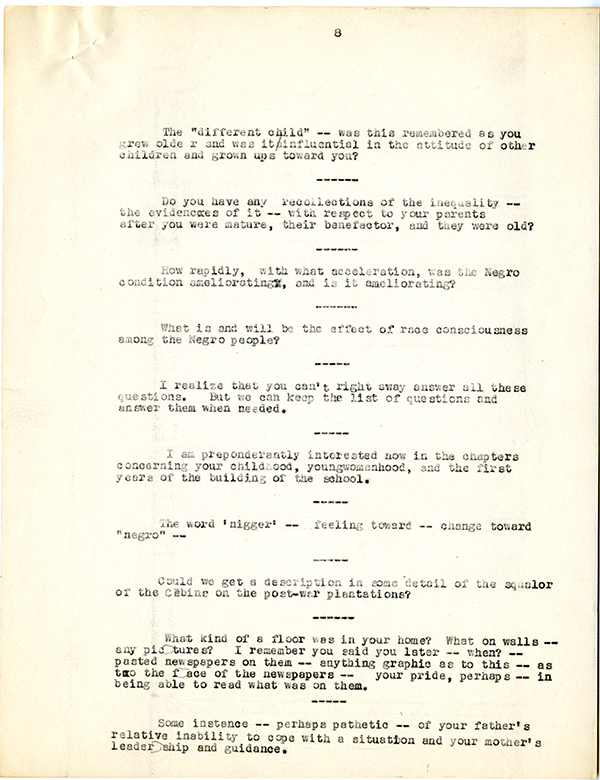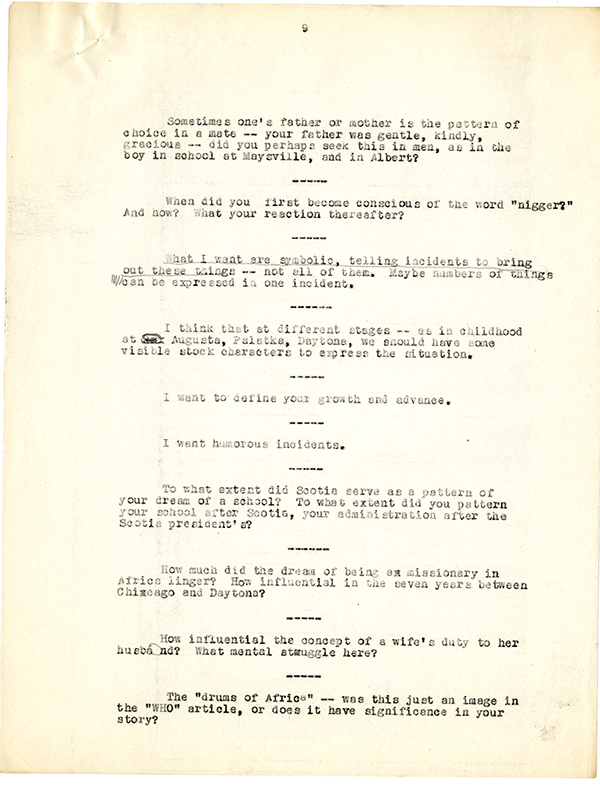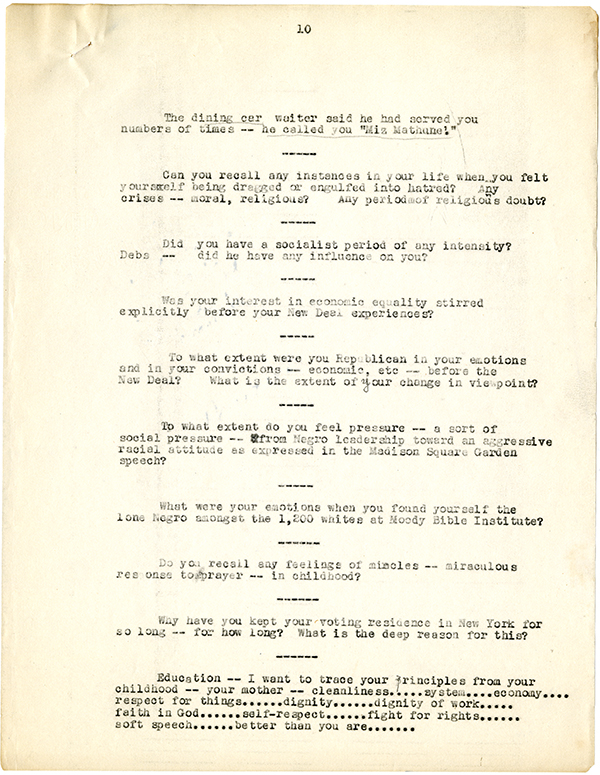Mary McLeod Bethune
Lesson Plans
Draft of Interview Questions
I think that at different stages — as in childhood at Augusta, Palatka, Daytona, we should have one visible stock characters to express the situation.
Page 5

The “different child” — was this remembered as you grew older and was it influential in the attitude of other children and grown ups toward you?
Do you have any recollections of the inequality — the evidences of it — with respect to your parents after you were mature, their benefactor, and they were old?
How rapidly, with what acceleration, was the Negro condition ameliorating, and is it ameliorating?
What is and will be the affect of race consciousness among the Negro people?
I realize that you can’t right away answer all these questions. But we can keep the list of questions and answer them when needed.
I am preponderantly interested now in the chapters concerning your childhood, youngwomanhood, and the first years of building the school.
The word ‘nigger’ — feeling toward — change toward “negro” —
Could we get a description in some detail of the squalor of the cabins on the post-war plantations?
What kind of a floor was in your home? What on walls — and pictures? I remember you said you later -- when? — pasted newspapers on them — anything graphic as to this — as to the face of the newspapers — your pride, perhaps — in being able to read what was on them.
Some instance — perhaps pathetic — of your father’s relative inability to cope with a situation and your mother’s leadership and guidance.
Do you have any recollections of the inequality — the evidences of it — with respect to your parents after you were mature, their benefactor, and they were old?
How rapidly, with what acceleration, was the Negro condition ameliorating, and is it ameliorating?
What is and will be the affect of race consciousness among the Negro people?
I realize that you can’t right away answer all these questions. But we can keep the list of questions and answer them when needed.
I am preponderantly interested now in the chapters concerning your childhood, youngwomanhood, and the first years of building the school.
The word ‘nigger’ — feeling toward — change toward “negro” —
Could we get a description in some detail of the squalor of the cabins on the post-war plantations?
What kind of a floor was in your home? What on walls — and pictures? I remember you said you later -- when? — pasted newspapers on them — anything graphic as to this — as to the face of the newspapers — your pride, perhaps — in being able to read what was on them.
Some instance — perhaps pathetic — of your father’s relative inability to cope with a situation and your mother’s leadership and guidance.
Page 6

Sometimes one’ father or mother is the pattern choice in a mate — your father was gentle, kindly, gracious — did you perhaps seek this in men, as in the boy in school at Maysville, and in Albert?
When did you first become conscious of the word “nigger?” And how? What your reaction thereafter?
What I want are symbolic, telling incidents to bring out these things — not all of them. Maybe numbers of things can be expressed in one incident.
I think that at different stages — as in childhood at Augusta, Palatka, Daytona, we should have one visible stock characters to express the situation.
I want to define your growth and advance.
I want humorous incidents.
To what extent did Scotia serve as a pattern of your dream of a school? To what extent did you pattern your school after Scotia, your administration after the Scotia president’s?
How much did the dream of being a missionary in Africa linger? How influential in the seven years between Chicago and Daytona?
How influential the concept of a wife’s duty to her husband? What mental struggle here?
The “drums of Africa” — was this just an image in the “WHO” article, or does it have significance in your story?
When did you first become conscious of the word “nigger?” And how? What your reaction thereafter?
What I want are symbolic, telling incidents to bring out these things — not all of them. Maybe numbers of things can be expressed in one incident.
I think that at different stages — as in childhood at Augusta, Palatka, Daytona, we should have one visible stock characters to express the situation.
I want to define your growth and advance.
I want humorous incidents.
To what extent did Scotia serve as a pattern of your dream of a school? To what extent did you pattern your school after Scotia, your administration after the Scotia president’s?
How much did the dream of being a missionary in Africa linger? How influential in the seven years between Chicago and Daytona?
How influential the concept of a wife’s duty to her husband? What mental struggle here?
The “drums of Africa” — was this just an image in the “WHO” article, or does it have significance in your story?
Page 7

The dining car waiter said he had served you numbers of times — he called you “Miz Mathune!”
Can you recall any instances in your life when you felt yourself being dragged or engulfed into hatred? Any crisis — moral, religious? Any period of religious doubt?
Did you have a socialist period of any intensity? Debs — did he have any influence on you?
Was your interest in economic equality stirred explicitly before your New Deal experiences?
To what extent were you Republican in your emotions and in your convictions — economic, etc — before the New Deal? What is the extent of your change in viewpoint?
To what extent to you feel pressure — a sort of social pressure — form Negro leadership toward an aggressive racial attitude as expressed in the Madison Square Garden speech?
What were your emotions when you found yourself the one Negro among the 1,200 white at Moody Bible Institute?
Do you recall any feelings or miracles — miraculous response to prayer — in childhood?
Why have you kept your voting residence in New York for so long — for how long? What is the deep reason for this?
Education — I want to trace your principles from your childhood — your mother — cleanliness… system… economy… respect for things… dignity… dignity of work… faith in God… self-respect… fight for rights… soft speech… better than you are…
Can you recall any instances in your life when you felt yourself being dragged or engulfed into hatred? Any crisis — moral, religious? Any period of religious doubt?
Did you have a socialist period of any intensity? Debs — did he have any influence on you?
Was your interest in economic equality stirred explicitly before your New Deal experiences?
To what extent were you Republican in your emotions and in your convictions — economic, etc — before the New Deal? What is the extent of your change in viewpoint?
To what extent to you feel pressure — a sort of social pressure — form Negro leadership toward an aggressive racial attitude as expressed in the Madison Square Garden speech?
What were your emotions when you found yourself the one Negro among the 1,200 white at Moody Bible Institute?
Do you recall any feelings or miracles — miraculous response to prayer — in childhood?
Why have you kept your voting residence in New York for so long — for how long? What is the deep reason for this?
Education — I want to trace your principles from your childhood — your mother — cleanliness… system… economy… respect for things… dignity… dignity of work… faith in God… self-respect… fight for rights… soft speech… better than you are…

 Listen: The World Program
Listen: The World Program